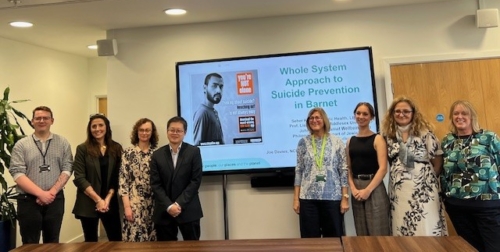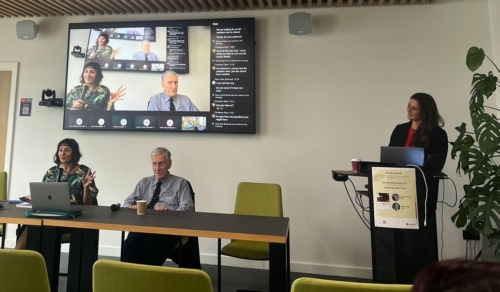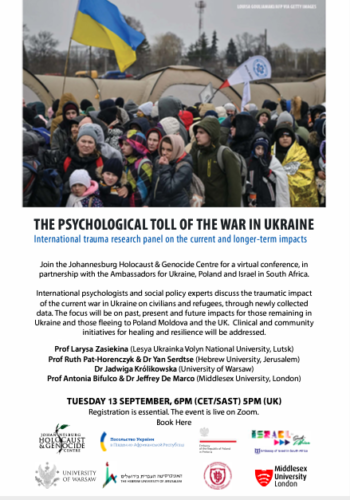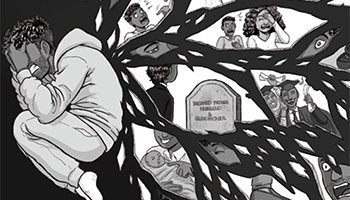News & Activities

At the award ceremony, they said:
“Lisa is recognised for her world-leading research in suicide and self-harm prevention, which has saved lives and shaped national and international practice. Her research has directly informed major public safety initiatives, including transport-related prevention policies and interventions.
Through her pioneering methodology, responsible approach to media guidance and contributions to multiple United Nation’s Sustainable Development Goals, Lisa exemplifies knowledge turned into action.”
She talked about Barnet Council’s Suicide Prevention campaign that she co-evaluated. The campaign is estimated to have saved between six to nine lives over a nine-month period and Middlesex University academics lead by Lisa who evaluated the campaign believe it could be expanded across London.
Prof Marzano is also co-leading the QUESST research project, and the team recently organised a workshop on the ethical and legal aspects of suicide surveillance technologies (WELASST25) which was packed with thought provoking talks and discussions. The team, including Dr Bethany Cliffe, Dr Laura Joyner, Dr Jay Mackenzie, and Dr. Carlisle George had the chance to present some of our ethics-related findings from the QUESST project to date.
The visit, hosted by the London Borough of Barnet, showcased innovative local work on public health and mental wellbeing — including Barnet’s pioneering approach to suicideprevention and resilience-building across schools and communities.
Barnet has launched its first Suicide Prevention Strategy 2021-25, in response to the negative impact of the pandemic and increased cost of living on mental wellbeing. The strategic vision was to reduce suicide and self-harm across Barnet through co-ordinated, data driven and evidence-based interventions with strong focus on cross-sector collaboration.
As part of the session on “Engagement and Delivery of Preventative Mental Health Approaches”, Prof Lisa Marzano, our Co-Director, joined Seher Kayıkcı, Philippa Carr, John Truong (Meridian Wellbeing), Keely Parnaby and Briony Banks (Inclusion Barnet /Inclusion Unlimited), and Joe Davies (NCL Suicide Prevention Programme) to discuss the Whole system approach to Suicide Prevention for the borough’s Suicide Prevention Strategy 2026–30.
Barnet’s suicide rates have remain significantly lower than both London as a whole and the rest of England. It may be associated with the collective preventative action that has taken place over the years.
co-authors Prof Erminia Colucci (Middlesex University) and Emeritus Prof David Lester (Stockton University, USA) shared powerful insights into the role of culture in suicide research and prevention. The event, chaired by our co-director, Prof Lisa Marzano, featured thought-provoking presentations, readings, and a rich discussion with participants joining both online and in Hendon.
We thank our colleagues, students, and external guests for their engaging questions and contributions, and extend our congratulations to the authors on this important work.
The book ‘Suicide and Culture 2.0’ integrates the role of culture, critical in preventing suicide. The book explores suicide in different cultural contexts, highlights how to conduct culturally sensitive studies, and examines the unique perspective of the role culture plays in suicide research and prevention.
With the current domination of individual and largely biomedical approaches in the field, these leading social scientists and suicide researchers carefully show how important integrating sociocultural factors is in helping to prevent people from dying by suicide and support those who live with suicidality.
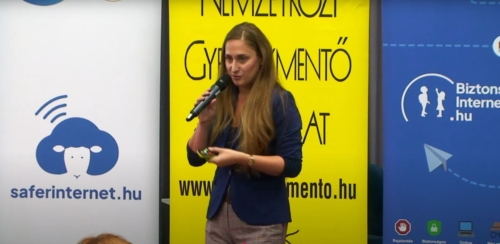
At the XV. Média- és Internetkonferencia in Budapest, Hungary, our researcher, B. Meggyesfalvi presented on how children and adolescents can engage in problematic online activities in digital environments, potentially becoming offenders.
From trolling, hacking, sexting, and illegal gambling to deepfake harassment and money muling, studies show that a significant proportion of 10–16 year olds engage in behaviours that carry legal and psychological risks. Behind these actions lie a mix of curiosity, thrill-seeking, lack of guidance and safety-by-design, peer influence, and exploitation by groomers and com networks.
The key question we continue researching: How can we protect and support young people before they become victims and/or perpetrators in online spaces?

Our next Innovation Lab is coming soon! Join us in London on 13th October to explore digital approaches to suicide & self-harm prevention.
To find out more and register your interest by 15th Sept 2025: https://www.phiuk.org/news/pmh-innovation-lab-digital-innovations-for-suicide-and-self-harm-prevention
The Innovation Lab brought together researchers, organisations, & individuals to spark new ideas and collaborative projects for boosting youth mental health at a population level.
As a partner in the Consortium, we are delighted to be co-hosting the next Innovation Lab in London in October (Middlesex University), and will focus on Digital and Technological Interventions to Prevent Suicide and Self-Harm.
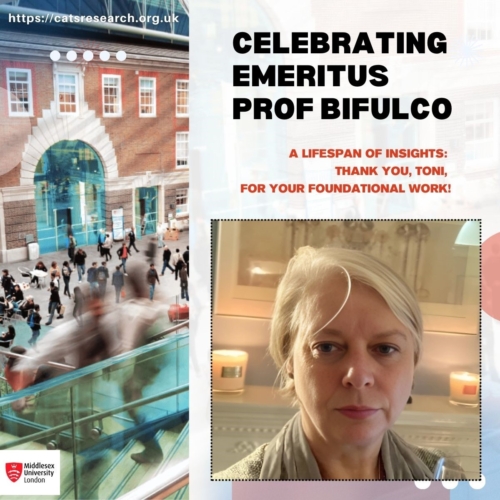
We are joining in celebrating the excellence, compassion, and leadership of Emeritus Professor Antonia Bifulco. Every year, Middlesex University awards Middlesex Medals to individuals for their outstanding contributions to the community and the University’s values. In 2025, the recipients included Emeritus Professor Antonia Bifulco, who is our founder and previous director of the Centre for Abuse, Trauma and Suicide Studies | Middlesex University, a leading psychologist and academic whose pioneering research in trauma, attachment, and abuse has significantly advanced mental health care and social policy.
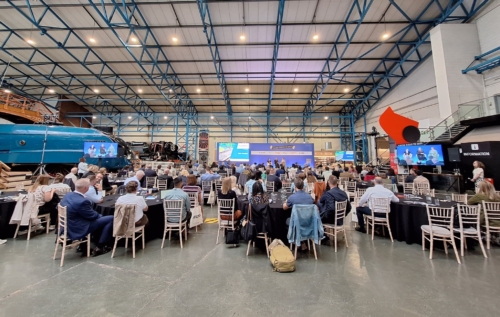
Earlier this month, we had the opportunity to present our work at the 4th edition of the TRESPAD conference – an international event hosted at the National Railway Museum in York, co-organised by UIC – International union of railways #UICrail, Network Rail, and RSSB. The venue, – set in the heart of the museum – was as unique as the conversations taking place.
With over 220 attendees from 22 countries including Argentina, Canada, the USA, and across Europe, the conference brought together professionals from rail and road safety, insurance, academia, journalism, as well as manufacturers of railway safety devices.
Our team was involved in two presentations that focused on the role of smart surveillance technologies in preventing suicides on the railway:
Our researcher, Dr Laura Joyner presented “Can surveillance help identify suicidal behaviour on the railways? Insights from a psychological autopsy study and systematic review”.
The presentation combined research from two projects: Psychological autopsy study of railway suicides: a project led by our director, Prof Lisa Marzano (funded by Network Rail), and technological insights from a systematic review – the ongoing QUESST project (funded by the NIHR (National Institute for Health and Care Research)) led by Prof Marzano and Jay Mackenzie (University of Westminster). In the talk, Dr Joyner summarised some notable patterns of behaviours which had been identified from the case records, and considered the implications for using smart surveillance technology to support suicide prevention in these railway environments.
Dr Bethany Cliffe, from the QUESST project, presented findings from surveys and focus groups with rail industry professionals. Her presentation highlighted both the potential and the challenges of implementing smart surveillance technologies in high-risk settings.
Other co-authors from the QUESST project are Hilary Norman, Sophie Brown, Steven MacDonald-Hart, Keith Hawton, Elizabeth Pettersen, Ian Marsh, and Penny Phillips.
Presenters left feeling energised by the conversations and inspired by the shared commitment to improving safety and saving lives.
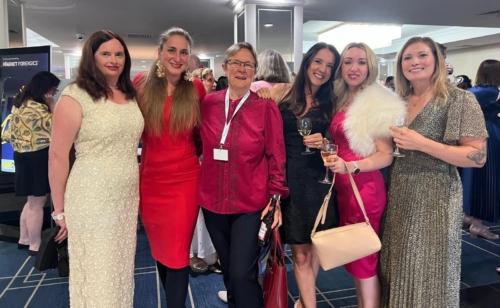
“Tech companies should hear loud and clear that if their technology hides child abuse, that is on them – and has to change.” – said Jess Phillips MP, Minister for Safeguarding and Violence Against Women and Girls (UK Home Office) in a powerful opening keynote, making it clear: the government will go above and beyond the OnlineSafetyAct to tackle child sexual abuse.
Besides connecting with brilliant colleagues and dedicated partners such as Resolver Trust & Safety and the Internet Watch Foundation (IWF) working to protect and enhance the wellbeing of children in the digital age, over three powerful days, our members engaged in thoughtful discussions on the scale and impact of online child abuse, the innovative technologies being developed to counter it, and the collaborative efforts making a real difference on the ground.
They attended interesting sessions and the important Excellence in Online Protection awards event, sponsored by Magnet Forensics and SAS, celebrating amazing nominees’ and winners’ inspiring contributions in the online child protection sphere. We extend our warmest congratulations to them!
It was empowering to be part of this event, and we are grateful to the organisers at International Policing and Public Protection Research Institute (IPPPRI) (Anglia Ruskin University)! Our Team is looking forward to next year’s event!
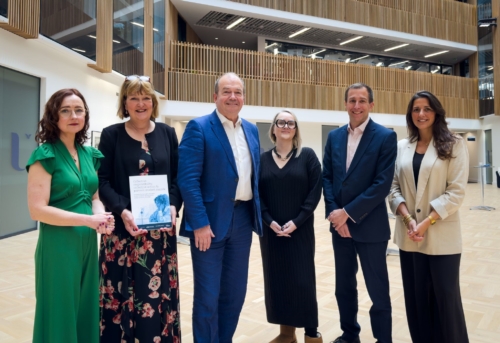
Our Director, Professor Lisa Marzano, gave a powerful keynote address at the “Creating Safer Spaces in Higher Education NI” event, hosted by Ulster University in collaboration with Queen’s University Belfast.
In the event, funded by the Public Health Agency (PHA), they discussed the recently published Guidance for HE to Illustrate Collective Responsibility, Collective Action to Prevent Student Suicide. Professor Marzano, a leading expert in psychology and suicide prevention, presented on “Restricting Access to Means: An Evidence-Based Approach to Suicide Prevention.”
Her insightful keynote offered valuable guidance based on rigorous research, emphasising how critical it is to reduce access to potential means as part of comprehensive suicide prevention strategies within higher education settings.
Based on current research, serious incident reviews and inquest data, the guidance is designed to help institutions think through key risk factors and reducing/restricting access to potential means and methods of suicide in a higher education context. The collaborative development of this guidance has been supported by a wide range of national stakeholders including researchers, HE practitioners, bereaved family members and students.

Our team members, Prof Elena Martellozzo, Paula Bradbury and Boglarka Meggyesfalvi recently participated in the Annual Safeguarding Conference of the Safeguarding and Child Protection Association (SACPA) and Boarding Schools’ Association (BSA). The presentation focused on our recent research into safeguarding children in virtual reality.
One of the highlights of the event was when we had the chance to watch two short videos made by educational practitioners interviewing children before and after watching our short videos on navigating the Metaverse safely:
link to playlist. A great feedback from them showcased that they found it understandable, insightful and usable.
We’d like to extend our gratitude to Claire Dan, her team, the other panellist professionals, and to all the children who contributed their perspectives, adding depth and relevance to the conversation. This event marks an important step in our ongoing work to ensure our outputs reach impact beyond the academic community and help enhance safety in the day-to-day work of practitioners. We look forward to continuing the dialogue and developing our research further.
For parents, educators, and professionals: Download the VIRRAC Toolkit report here for free.
VIRRAC (Virtual Reality Risks Against Children) was led by Professor Julia Davidson OBE, Director of the Institute of Connected Communities (University of East London), and Prof Elena Martellozzo, Associate Director at the Centre For Abuse & Trauma Studies (Middlesex University), with essential contributions from Dr Ruby Farr, Paula Bradbury, and Boglarka Meggyesfalvi, funded by the REPHRAIN National Research Centre on Privacy, Harm Reduction and Adversarial Influence Online.

We are happy to introduce our new logo! The new CATS logo cleverly incorporates an arch inspired by the entrance to Middlesex University’s main hall. Symbolically, this represents stepping through a door toward awareness, support, and positive behavioural change—perfectly aligning with our mission to create an inclusive, reflective community.
Alessandro Legname’s work on this logo has been greatly appreciated by our entire team, and we’re excited to see him continue flourishing in his design career!

Join us on the 6th of February 2025 for the discussion and talks by professionals on AI’s role in advancing justice.
What benefits and barriers do you see in using AI in a policing/justice context?
What are the urgent next steps that need to be taken to advance the use of AI in the criminal justice field?
Join us for our free online event, hosted by herEthical AI and Middlesex University: Beyond Bureaucracy: Applied AI in the Criminal Justice System.
Limited spaces are available so please secure your place by scanning on the QR code or clicking the link in the comments section to register.
As we explore the potential of AI in the criminal justice system, we must consider how the technologies can contribute to preventing and addressing gender-based violence, aligning with the campaign’s goals of ending impunity and implementing effective national action plans.
Working alongside exceptional colleagues and organisations made the experience enjoyable and fun! Thanks to colleagues Prof Elena Martellozzo, Prof Julia Davidson OBE, Paula Bradbury, Dr Ruby Farr, Boglarka Meggyesfalvi, Nina Jane Patel, Will Gardner OBE, and partners Kabuni and Childnet International. The project was funded by the REPHRAIN Centre, UKRI.
Part of the CATS Team participated at Eurocrim2024 Conference in Bucharest.
Four of our members participated in the Eurocrim2024 Conference in Bucharest, where we shared our latest research addressing key issues in cybercrime, juvenile justice, and online safety. Our contributions focused on advancing understanding in these areas, particularly with regard to innovative interventions and safeguarding practices. Below are some highlights from the presentations:
The Online Safety Bill & Content Moderators: Our “Invisible Risks” research explored the mental health implications for content moderators tasked with handling harmful online content, including child sexual abuse material (CSAM). The session also examined the broader effects of the UK’s Online Safety Bill, highlighting the need for structured support and coping mechanisms for these essential workers.
London Accommodation Pathfinder Project: This presentation focused on a pro-social programme designed to provide alternative pathways to custody for black and ethnic minority boys in London. The project aimed to demonstrate that early intervention through targeted, multi-disciplinary support can significantly reduce re-offending rates and improve mental health outcomes, offering a promising model for replication in other regions.
Victimisation in the Metaverse: Our “VIRRAC – Virtual Reality Risks Against Children” research project addressed the growing risks within virtual reality (VR) environments, particularly concerning children’s exposure to online harms such as sexual exploitation. The presentation underscored the urgent need for enhanced safety protocols and moderation in these immersive digital spaces to protect vulnerable users from potential abuse. We also presented the practical tools developed within the project, includingeducational short videos for young children
‘I Had No Choice’: Adult Neutralisation of Online Sexual Engagement with Children: This session explored the psychological processes that allow individuals to rationalise harmful online behaviours. Using neutralisation theory, the research provided critical insights into how adults justify online sexual interactions with minors, offering valuable implications for policy development and law enforcement.
We are grateful for the opportunity provided by the European Society of Criminology to present our research at Eurocrim2024 and engage with colleagues across the field.
The ‘Safeguarding Children in the Digital World’ conference took place in the historic main building of ELTE, focusing on online child protection, with the aim of facilitating international knowledge exchange on child safety, as well as the prevention and policing of online child sexual abuse.
Besides our colleagues, Prof Elena Martellozzo, Dr Jeffrey DeMarco, Dr Ruth Spence, Paula Bradbury, and Boglarka Meggyesfalvi, other renowned experts such as Dr István Ambrus, Dr Eszter Sarik, Dr Dorina Csalár LLM, and Dr Árpád Varga also shared insights from their valuable work.
The conference covered topics such as the impact of online pornography on young people and discussed new, emerging types of sexual offences in the online world. It showcased our work from the Invisible Risks research, generously funded by Tech Coalition & Safe Online, on the topic of secondary traumatisation of frontline workers exposed to online child sexual abuse material, and shared findings from the VIRRAC research, funded by REPHRAIN National Research Centre on Privacy, Harm Reduction and Adversarial Influence Online.
One of the highlights was the youth panel where young people’s voices could be heard directly about topics relevant to them concerning digital safeguarding.
We are grateful to the organisers, partners, and supporting organisations for providing the opportunity to share our work and make an impact internationally! We hope to return in the near future and collaborate more.

Find the book here. (Enter code FLR40 at
checkout for 20% discount).
Life happens. In Kipling’s words, the twin impostors of ‘triumph and disaster’, the best and worst the world can throw at us. Not all ‘life events’ are life-changing. At face value, many appear benign (leaving school, getting a job, moving in with a partner); whilst others seem inherently damaging (the death of someone close, a life-threatening illness, relationship break-up). Yet the extent to which a life event is ‘good’ or ‘bad’ is not necessarily intuitive, and it may surprise you to know that psychologists often continue to act as if it is.
Past activities

A remembrance for victims of the WWII organised by the ‘Syberacy’ organization – the descendants of children exported from Poland to Siberia in 1940 who found refuge in S Africa. Prof Bifulco’s keynote lecture ‘Trauma in the context of war: Reflections on Polish experience in WWII and its impacts across generations’ generated considerable interest and discussion.

Toni Bifulco was invited to speak at this conference in paediatric psychology on: The consequences of child neglect in paediatric conditions. The conference had great international contributions to an important issue. With thanks to the organisers Prof Perricone, Prof Pelizzi and Dr Valentina Fortana.

Read more.




